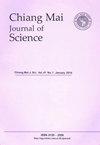Stability of Terminalia bellirica Extract and Its Combination Effect with Alpha-Mangostin in Inhibiting Dengue Virus Infection
IF 0.8
4区 综合性期刊
Q3 MULTIDISCIPLINARY SCIENCES
引用次数: 0
Abstract
Dengue virus (DENV) infection has been reported to be continuously increasing worldwide. Currently, there is no effective treatment specific to DENV infection, in addition, the efficiencies of the vaccines are not fully effective against all four circulating DENV serotypes. Therefore, the development of an anti-viral agent to combat DENV infection and lower the risk of disease progression is needed, especially in the endemic area. This study investigated the effect of Terminalia bellirica extract and its combination with alpha-mangostin (α-MG) in lowering the DENV serotype 2 infection in Vero cells and A549 lung adenocarcinoma cells. The phytochemical characterization of T. bellirica extract demonstrated that T. bellirica extract contained a total phenolic compound of 198.29 ± 15.95 mg gallic acid/g extract in which the gallic acid was the major bioactive compound, judged by HPLC. Treatment with 50 μg/mL of T. bellirica extract caused over 50% of DENV envelope protein reduction in Vero cells and showed no significant attenuation upon the six rounds of thermal stress exposures. At an equal concentration, the efficiency of T. bellirica extract in A549 cells was lower than that of Vero cells; however, combination with low-dose α-MG (0.5-2 μg/mL) showed to significantly improve the inhibitory activity of T. bellirica extract. This study demonstrated the great stability of T. bellirica extract to inhibit DENV infection and suggested a combination approach with α-MG offered protection against the DENV tissue tropism.黄芩提取物的稳定性及其与α -山竹苷联合抑制登革热病毒感染的作用
据报道,登革热病毒(DENV)感染在世界范围内不断增加。目前,没有针对DENV感染的有效治疗方法,此外,疫苗的效率并非对所有四种流行DENV血清型都完全有效。因此,需要开发一种抗病毒药物来对抗DENV感染并降低疾病进展的风险,特别是在流行地区。本研究探讨了黄芩提取物及其联合α-山竹苷(α-MG)降低Vero细胞和A549肺腺癌细胞DENV血清2型感染的作用。HPLC法测定白刺草提取物的总酚类化合物含量为198.29±15.95 mg没食子酸/g提取物,其中没食子酸为主要活性化合物。50 μg/mL白头藤提取物可使Vero细胞DENV包膜蛋白减少50%以上,且在6轮热应激后无明显衰减。在相同浓度下,黄芪提取物在A549细胞中的效率低于Vero细胞;而与低剂量α-MG (0.5 ~ 2 μg/mL)联合使用可显著提高白刺草提取物的抑菌活性。本研究证实了白莲提取物对DENV感染的抑制作用具有很强的稳定性,并提示其与α-MG联合使用可抑制DENV的组织趋向性。
本文章由计算机程序翻译,如有差异,请以英文原文为准。
求助全文
约1分钟内获得全文
求助全文
来源期刊

Chiang Mai Journal of Science
MULTIDISCIPLINARY SCIENCES-
CiteScore
1.00
自引率
25.00%
发文量
103
审稿时长
3 months
期刊介绍:
The Chiang Mai Journal of Science is an international English language peer-reviewed journal which is published in open access electronic format 6 times a year in January, March, May, July, September and November by the Faculty of Science, Chiang Mai University. Manuscripts in most areas of science are welcomed except in areas such as agriculture, engineering and medical science which are outside the scope of the Journal. Currently, we focus on manuscripts in biology, chemistry, physics, materials science and environmental science. Papers in mathematics statistics and computer science are also included but should be of an applied nature rather than purely theoretical. Manuscripts describing experiments on humans or animals are required to provide proof that all experiments have been carried out according to the ethical regulations of the respective institutional and/or governmental authorities and this should be clearly stated in the manuscript itself. The Editor reserves the right to reject manuscripts that fail to do so.
 求助内容:
求助内容: 应助结果提醒方式:
应助结果提醒方式:


